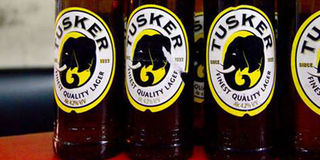Brewer cries foul on high retail prices

Tusker beer, a product of East African Breweries Limited. Data from regional brewer East African Breweries (EABL) shows that bars could be making 10 times the recommended earnings from certain bottled brands. PHOTO | SALATON NJAU | NATION MEDIA GROUP
What you need to know:
- The brewer posted Sh10.3 billion net earnings in 2015/2016, but cited stagnated sales even though there was a 16 per cent rise in Kenya.
- The government received close to Sh35 billion from the firm in excise taxes alone, meaning increased sales would earn the taxman more.
Many beer retailers are keeping the prices high despite being allocated lucrative profit margins.
Data from regional brewer East African Breweries (EABL) shows that bars could be making 10 times the recommended earnings from certain bottled brands.
Tusker, one of the company’s flagship brands, is for instance released from the Thika-road brewer at Sh121 per bottle.
It is then transported to various distributor outlets across the country who sell it to retailers at Sh127, so as to reach the consumers at the recommended price of Sh140 a bottle.
The transport charge is borne by EABL, with distributors completing the chain. Nairobi has six distributors while all major towns have at least one.
A spot check revealed that many retailers sell beer to consumers at high profit margins.
Some pubs in Nairobi’s CBD retail beer at Sh350, while the majority sell it at Sh250 per bottle. The brewer said its sales are affected by “poor retail discipline”.
Outgoing EABL Group MD Charles Ireland said inflation of profit margins has a negative effect on the entire value chain.
“It’s neither good for customers, nor for retailers as the sales decline. This results in less revenue for all, including the government,” he said.
The brewer posted Sh10.3 billion net earnings in 2015/2016, but cited stagnated sales even though there was a 16 per cent rise in Kenya.
The government received close to Sh35 billion from the firm in excise taxes alone, meaning increased sales would earn the taxman more.
Only a negligible percentage of beer retailers have electronic tax registers, costing the country millions of shillings in unpaid revenues.
Bar owners cited expensive utilities such as rent and power bills, as well as additional ambience like sound and video, as the reasons for overpricing beer.
Some bars in Nairobi sell more than 200 crates of beer on Sundays.
The over 35,000 bar owners in Kenya have regional associations where they fix retail prices, among other issues.
The Consumer Federation of Kenya and the Competition Authority of Kenya have both promised to look into the matter.





